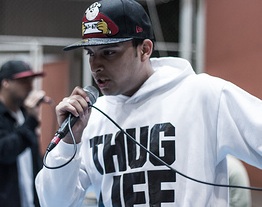
Hearkening back to Tipper Gore’s contested campaign against violent rap music, using rap lyrics as a conviction tool in criminal investigations is not as uncommon as you might think. Onthemedia.org discussed police work and rap lyrics with Kathleen Horan and the use of rap lyrics as evidence with University of California, Irvine sociologist Charis Kubrin.
Horan asserts that rap lyrics can and are being used to police gangs. Police have been able to locate videos of certain crews taunting other crews in the form of rap music. The lyrics don’t necessarily name a victim or perpetrator but are suggestive of the circumstances of crimes. Horan points to lyrics from one of the Flock crew’s raps, that was posted to YouTube, as an example:
Better take your last breath, yeah.
Next time I see your name comin’
It’s at the [ ? ]
And I didn’t really want to do it
But I had to
Put myself in your shoes
This [ ? ] I’d be mad too…
Horan asserts that, while one rap video isn’t going to be enough to bring down a crew, rap lyrics do and should operate as a component of an investigation.
Sociologist Charis Kubrin tells a different side of the story through the experiences of aspiring rapper Tosin. Tosin was found guilty of making terroristic threats based on the “incriminating evidence” of his rap lyrics. The racial stereotypes surrounding rap music, Kubrin believes, make guilty convictions more likely in these scenarios, and as a result, she argues that rap lyrics are prejudicial and shouldn’t be used in court.
![]()

Comments 1
Friday Roundup: Jan. 31, 2014 » The Editors' Desk — January 31, 2014
[…] “An Unlikely Rap Sheet,” by Kat Albrecht. NPR explores the use of rap lyrics in courtrooms. Poetry and self-expression or incriminating confession? […]